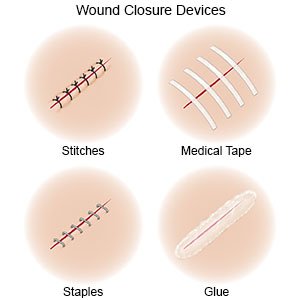Care for your Stitches
Medically reviewed by Drugs.com. Last updated on May 6, 2024.
What are stitches?
Stitches, or sutures, are used to close cuts and wounds on the skin. Stitches need to be removed after your wound has healed.
 |
How do I care for my stitches?
- Protect the stitches. You may need to cover your stitches with a bandage for 24 to 48 hours, or as directed. Do not bump or hit the suture area. This could open the wound. Do not trim or shorten the ends of your stitches. If they rub on your clothing, put a gauze bandage between the stitches and your clothes.
- Clean the area as directed. Carefully wash your wound with soap and water. For mouth and lip wounds, rinse your mouth after meals and at bedtime. Ask your healthcare provider what to use to rinse your mouth. If you have a scalp wound, you may gently wash your hair every 2 days with mild shampoo. Do not use hair products, such as hair spray. Check your wound for signs of infection when you clean it. Signs include redness, swelling, and pus.
- Keep the area dry as directed. Wait 12 to 24 hours after you receive your stitches before you take a shower. Take showers instead of baths. Do not take a bath or swim. Your healthcare provider will give you instructions for bathing with your stitches.
What can I do to help my wound heal?
- Elevate your wound. Keep your wound above the level of your heart as often as you can. This will help decrease swelling and pain. Prop the area on pillows or blankets, if possible, to keep it elevated comfortably.
- Limit activity. Do not stretch the skin around your wound. This will help prevent bleeding and swelling.
When should I seek immediate care?
- Your stitches come apart.
- Blood soaks through your bandages.
- You suddenly cannot move your injured joint.
- You have sudden numbness around your wound.
- You see red streaks coming from your wound.
When should I contact my healthcare provider?
- You have a fever and chills.
- Your wound is red, warm, swollen, or leaking pus.
- There is a bad smell coming from your wound.
- You have increased pain in the wound area.
- You have questions or concerns about your condition or care.
Care Agreement
You have the right to help plan your care. Learn about your health condition and how it may be treated. Discuss treatment options with your healthcare providers to decide what care you want to receive. You always have the right to refuse treatment. The above information is an educational aid only. It is not intended as medical advice for individual conditions or treatments. Talk to your doctor, nurse or pharmacist before following any medical regimen to see if it is safe and effective for you.© Copyright Merative 2024 Information is for End User's use only and may not be sold, redistributed or otherwise used for commercial purposes.
Further information
Always consult your healthcare provider to ensure the information displayed on this page applies to your personal circumstances.
